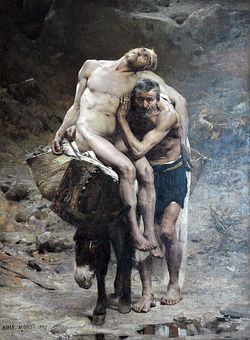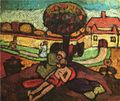Category:Good Samaritan (subject)
The Good Samaritan was one of the Parables of Jesus, according to the Gospel of Luke (10:25-37).
Overview
The question is about salvation ("What must I do to inherit eternal life?"). Jesus' answer confirms that love for God and love for your neighbor are the requirements. When solicited to clarify what "love for your neighbor" means, Jesus replies with a parable. The protagonist is not a Jew, but a Samaritan, that is, a member of an "other" religious community, somebody who was not "expected" to be saved. The Samaritan is presented as a person, whose righteousness is superior to that of the Jewish priest and the Jewish levite who saw the man in need but passed by. The Samaritan instead "was moved with pity" and "took care" of the man in trouble. The Samaritan is the example of a righteous person who "inherited eternal life" since he was "the one who showed mercy."
The point of the Parable was not that "your" neighbor includes those who were outside the community of faith of Israel, but that salvation was open to all those who love their neighbor, regardless of their community of faith.
Good Samaritan, in ancient sources
Gospel of Luke
Luke 10:25-37 (NRSV) -- 25 Just then a lawyer stood up to test Jesus. "Teacher," he said, "what must I do to inherit eternal life?" 26 He said to him, "What is written in the law? What do you read there?" 27 He answered, "You shall love the Lord your God with all your heart, and with all your soul, and with all your strength, and with all your mind; and your neighbor as yourself." 28 And he said to him, "You have given the right answer; do this, and you will live." 29 But wanting to justify himself, he asked Jesus, "And who is my neighbor?" 30 Jesus replied, "A man was going down from Jerusalem to Jericho, and fell into the hands of robbers, who stripped him, beat him, and went away, leaving him half dead. 31 Now by chance a priest was going down that road; and when he saw him, he passed by on the other side. 32 So likewise a Levite, when he came to the place and saw him, passed by on the other side. 33 But a Samaritan while traveling came near him; and when he saw him, he was moved with pity. 34 He went to him and bandaged his wounds, having poured oil and wine on them. Then he put him on his own animal, brought him to an inn, and took care of him. 35 The next day he took out two denarii, gave them to the innkeeper, and said, 'Take care of him; and when I come back, I will repay you whatever more you spend.' 36 Which of these three, do you think, was a neighbor to the man who fell into the hands of the robbers?" 37 He said, "The one who showed him mercy." Jesus said to him, "Go and do likewise."
Cf. Gospel of Barnabas
[30] Jesus went to Jerusalem, near unto the Senofegia ( = Tabernacles), a feast of our nation. The scribes and Pharisees having perceived this, took counsel to catch him in his talk. Whereupon, there came to him a doctor, saying: 'Master, what must I do to have eternal life?' Jesus answered: 'How is it written in the law?' The tempter answered, saying: 'Love the Lord thy God, and thy neighbor. Thou shalt love thy God above all things, with all thy heart and thy mind, and thy neighbor as thyself.' Jesus answered: 'Thou hast answered well: therefore go and do thou so, I say, and thou shalt have eternal life.' He said unto him: 'And who is my neighbor?' Jesus answered, lifting up his eyes: 'A man was going down from Jerusalem to go unto Jericho, a city rebuilt under a curse. This man on the road was seized by robbers, wounded and stripped; whereupon they departed, leaving him half dead. It chanced that a priest passed by that place, and he, seeing the wounded man, passed on without greeting him. In like manner passed a Levite, without saying a word. It chanced that there passed [also] a Samaritan, who, seeing the wounded man, was moved to compassion, and alighted from his horse, and took the wounded man and washed his wounds with wine, and anointed them with ointment, and binding up his wounds for him and comforting him, he set him upon his own horse. Whereupon, having arrived in the evening at the inn, he gave him into the charge of the host. And when he had risen on the morrow, he said: "'Take care of this man, and I will pay thee all." And having presented four gold pieces to the sick man for the host, he said: "'Be of good cheer, for I will speedily return and conduct thee to my own home."' 'Tell me,' said Jesus, 'which of these was the neighbor?' The doctor answered: 'He who showed mercy.' Then said Jesus: 'Thou has answered rightly; therefore go and do thou likewise.' The doctor departed in confusion.
Good Samaritan, in the arts
External links
Pages in category "Good Samaritan (subject)"
The following 10 pages are in this category, out of 10 total.
1
- Charitable Samaritan (1638 Rembrandt), art
- Parable of the Good Samaritan (1670 Wijnants), art
- Good Samaritan (1737 Hogarth), art
- Good Samaritan (1870 Moreau), art
- The Good Samaritan (1870 Ribot), art
- The Good Samaritan (1874 Surikov), art
- Good Samaritan (1880 Morot), art
- Good Samaritan (1885 Hodler), art
- Good Samaritan (1890 Van Gogh), art
- Good Samaritan (1907 Modersohn-Becker), art










